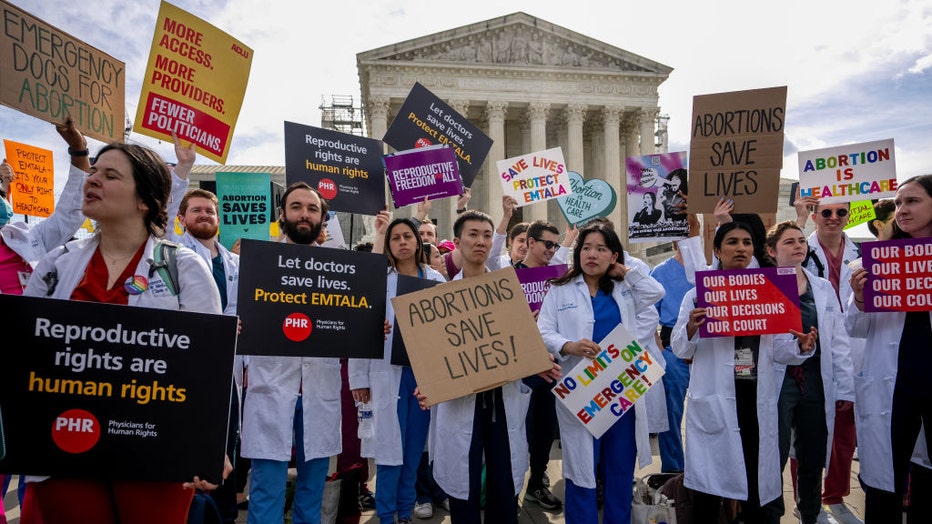Supreme Court allowing emergency abortions in Idaho in limited ruling
The Supreme Court cleared the way for Idaho hospitals to provide emergency abortions for now in a procedural ruling that left key questions unanswered and could mean the issue ends up before the conservative-majority court again soon.
Thursday's ruling came a day after an opinion was briefly posted on the court's website mistakenly and quickly taken down, but not before it was obtained by Bloomberg, the Associated Press reported.
The final opinion appears largely similar to the draft released earlier. Additionally, it reverses the court's earlier order that had allowed an Idaho abortion ban to go into effect, even in medical emergencies.
Justice Elena Kagan had a concurring opinion in the case, joined by Justice Sonya Sotomayor, and in part by Justice Ketanji Brown Jackson.
An opinion from Justice Amy Coney Barrett, Chief Justice John Roberts and Justice Brett Kavanaugh stated that they agreed with the decision to dismiss the case to the extent, in their view, it's changed since they agreed earlier this year to hear the case, according to the opinion ruling.
However, Jackson disagrees with the decision to dismiss the case, arguing that the need to answer the question presented by the case "only increased in the intervening the months."
Justice Samuel Alito had a dissenting opinion along with Justice Clarence Thomas and in part by Justice Neil Gorsuch. Alito in his dissent suggests that the court "should have resolved the merits of the case and ruled in Idaho's favor arguing that the federal law at issue "obligates hospitals receiving Medicare funding to treat and not abort an "unborn child."

FILE-A group of doctors join abortion rights supporters at a rally outside the Supreme Court on April 24, 2024 in Washington, D.C. (Photo by Andrew Harnik/Getty Images)
The justices determined that the court should not have been involved in the case so quickly, and a 6-3 majority reinstated a lower court order that allowed hospitals in Idaho to perform emergency abortions to protect a pregnant patient’s health.
According to the AP, the Idaho opinion doesn’t answer key questions about whether doctors can provide emergency abortions elsewhere, a significant issue as most Republican-controlled states have moved to restrict the procedure in the two years since the Supreme Court overturned Roe v. Wade.
The premature release of the SCOTUS opinion is the second time in two years that an abortion ruling was released early, though in slightly different circumstances. The court’s ruling ending the constitutional right to abortion was leaked to Politico, the AP noted.
Idaho enacts strict abortion law
Idaho is among 14 states that ban abortion at all stages of pregnancy with limited exceptions.
Idaho's law criminalized all abortions in "clinically diagnosable pregnancies," but allows physicians to defend themselves in court by arguing the procedure was necessary to avert the mother's death.
The state makes it a crime with a prison term of up to five years for anyone who performs or assists in an abortion.
Department of Justice files suit against Idaho
The DOJ sued Idaho earlier in August 2022, saying the abortion ban set to take effect violated the federal Emergency Medical Treatment and Labor Act (EMTALA).
The administration argued that EMTALA requires health care providers to perform abortions for emergency room patients when needed to treat an emergency medical condition, even if doing so might conflict with a state’s abortion restrictions.
In the case over hospital emergencies, the Biden administration argued that hospitals that receive Medicare funds are required by federal law to provide emergency care, potentially including abortion, no matter if there’s a state law banning abortion.
Conflicting court decisions
Shortly after the suit, U.S. District Judge B. Lynn Winmill in Idaho agreed with the administration.
Attorney General Merrick Garland, at the time, released a statement on the development.
"Today’s decision by the District Court for the District of Idaho ensures that women in the State of Idaho can obtain the emergency medical treatment to which they are entitled under federal law. This includes abortion when that is the necessary treatment. As the District Court ruled, a state law that attempts to prevent a hospital from fulfilling its obligations under EMTALA violates federal law and the Supremacy Clause of the U.S. Constitution," Garland said.
However, last year the U.S. 9th Circuit Court of Appeals sided with the state and dealt a blow to the Biden administration. But a larger contingent of 9th Circuit judges threw out the panel’s ruling and had set arguments in the case for late January.
Supreme Court allows Idaho abortion ban to go into effect amid legal fight
Anti-abortion politicians took the case to the higher court, and in January 2024, The Supreme Court allowed Idaho to enforce its strict abortion ban, even in medical emergencies while it decided on a final ruling.
The justices heard arguments in April.
The Idaho case gave the court its second major abortion dispute since the justices in 2022 overturned Roe v. Wade and allowed states to severely restrict or ban abortion.
President Joe Biden objected to the high court’s decision and said his administration "will continue to defend a woman’s ability to access emergency care under federal law."
Attorneys for both sides warned that the justices’ ruling could affect women and doctors far beyond Idaho, changing how emergency rooms treat patients in many other states.
The Associated Press contributed to this report. This story was reported from Los Angeles.

